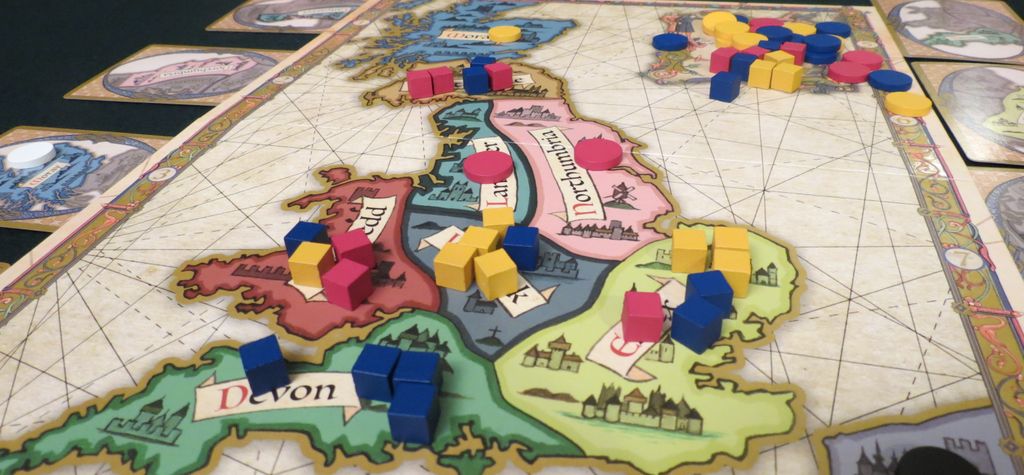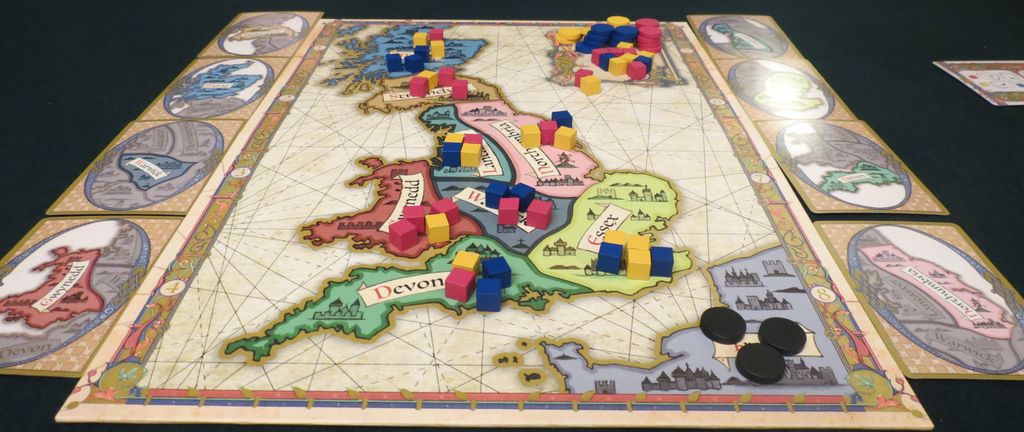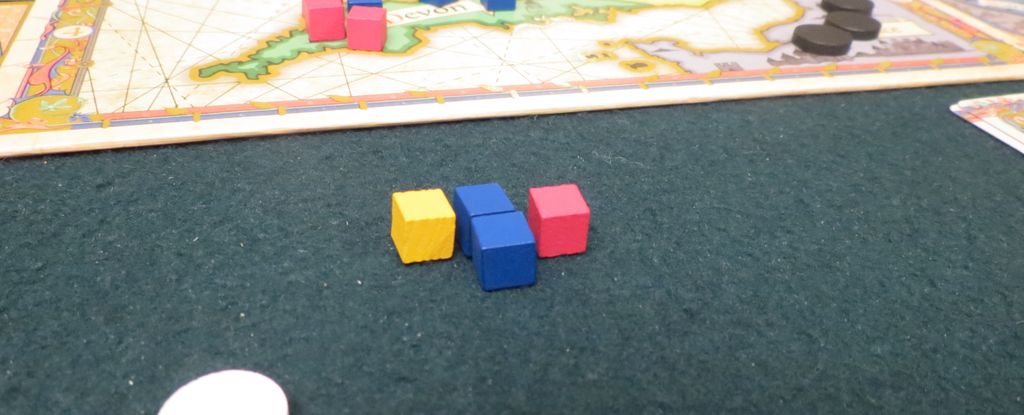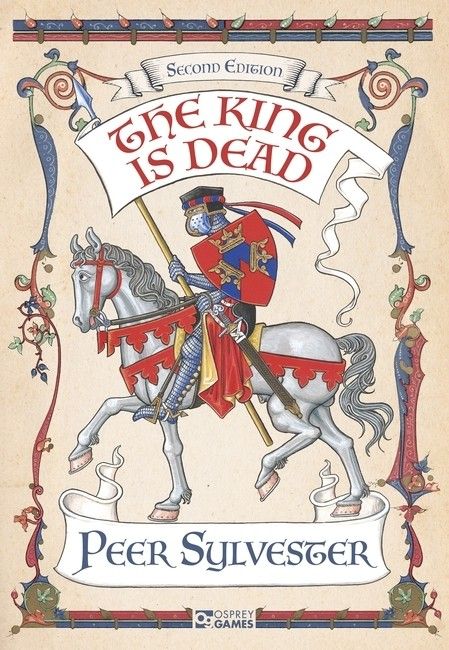Overview
Welcome to my review of The King Is Dead: Second Edition, an engaging journey into medieval power vacuums and strategic undertakings. In this review, we’re delving deep into the heart of this compelling board game. From peering into the fascinating intricacies of its ‘Power Struggle Mechanics’ and the twisty tales unspun in ‘Player Interaction Dynamics’ to weighing the hefty scales of ‘Strategic Depth’ – this isn’t merely a battle for a throne; it’s a masterful blend of psychology, cunning, and foresight. Strap in, strategists and board game aficionados! We’re about to uncover whether the crown of this game is worth donning or if it’s merely gilded with fool’s gold.
How It Plays
Setting Up
To kick things off with The King Is Dead: Second Edition, players must distribute power tokens amongst eight regions on the map which represents the areas of influence. After shuffling the deck of faction cards and giving everyone an equal hand, players place the three Factions – the Welsh, Scots, and English – in corresponding areas on the board.
Gameplay
Diving into gameplay involves players taking turns performing actions by playing a card to influence control over the regions. Each decision must be carefully weighed, as the right move can shift the power dynamics, while players work in silence, guided by limited card-driven actions. Collaboration may be necessary despite it being a struggle for a solitary victory.
Winning the Game
To reign supreme, players aim to have the most power tokens of a single Faction, thereby ensuring control over the throne when the game concludes. The board is a battleground for cerebral might, ensuring every power token counts towards potential victory or capitulation.
Want to know more? Read our extensive strategy guide for The King Is Dead: Second Edition.
Outwit, Outplay, Outlast: Power Politics
In my experiences around the table, the spark of genius in The King Is Dead: Second Edition Review is undoubtedly the tug-of-war within its power struggle mechanics. Cleverly marrying strategy with simplicity, each decision becomes a silent bid for influence across a fractured kingdom.
A Test of Wits
During one memorable game night, the unnerving silence as players plotted their moves was palpable. The cunning required to manipulate allegiances puts you at constant odds with your competitors. Importantly, this game has this unique way of making each card played feel profoundly impactful — whether it clinches a victory in a contested region or subtly shifts the balance of power.
Feigned Alliances
Often, as factions rose and fell, we found temporary alliances formed, only to be shattered later. The visceral impact of that betrayal when you outmaneuver your ‘ally’ for the win amplifies the intrigue of The King Is Dead’s design. Each playthrough, I’ve come to appreciate more deeply the dynamic subtleties embedded in its rules.
Following on this treacherous journey of command and conclave, let’s delve into the next section which will unravel the complexities of Player Interaction Dynamics.

Unearthing the Layers of Camaraderie and Rivalry
In my numerous visits to the metaphorical realm of ‘The King Is Dead: Second Edition’, I’ve been consistently struck by the player interaction dynamics it fosters. This isn’t a game where players retire to their own corner of England to tally their resources in solitude. Oh no, it’s an intricate dance of alliance and conflict, replete with shared side-glances and uneasy alliances.
Social Gambits and Betrayals
One vivid memory arose from a session with longstanding gaming friends – the type who know your strategies before you even unfurl them. We were embroiled in yet another tug-of-war for a region. Then, a cleverly timed card play forced us to trade influence markers, igniting tension at the table but concluding with shared laughter over the clever surprise. Such high-stakes exchanges, beckoning both betrayal and cooperation, are the heartbeat of ‘The King Is Dead’.
Critical Collaborations
Fascinatingly, while we all aim for the throne, there are times when working together is more profitable than solo heroics. In another playthrough, an emergencing threat required temporary unions so as to not sink individually – yet we promptly returned to our squabbles once the dust settled. This oscillation between confrontation and team tactics makes this game undeniably captivating and infinitely replayable.
After this enthralling slice of game night recapped for the ‘The King Is Dead: Second Edition Review’, Stay tuned for the next dive into Strategic Depth; where planning and spontaneity intertwine, shaping the rise or fall of regimes.

Delving into Strategic Depth
In The King Is Dead: Second Edition, each move is a riddle wrapped in a mystery, shrouded by a conundrum. I vividly recall nights where my friends and I would dive deep into the strategic play, conjecturing over potential outcomes inherent in the game’s mechanics. Navigating Uncertainty is an absolute must—as the scarcity of actions couples with the shifting alliances to create a nail-biting challenge.
Choice and Consequence elevate the game. Every decision from my sessions loomed large in its importance, with each placement of power making the tension palpable. Such depth ensures that veteran players can meet on common ground with newcomers, making it accessible yet profoundly tactical. A classic reborn, strategies employed in The King Is Dead can be as complex or simple as players decide—which is why, without reservation, I wholeheartedly recommend this as a must-try for anyone seeking a game rich in contemplative strategy.

Conclusion
Reflecting on ‘The King Is Dead: Second Edition,’ we get to conclude a fascinating journey through sophisticated strategy and social dynamics. This review has delved into the crux of the gameplay, discussing its intriguing power struggle mechanics, the captivating interaction among players, and the satisfying strategic depth that demands foresight and adaptability. Games that balance these elements well typically become staples within the board game community, and from our play experiences, it feels like this one fits the profile. Whether it’s securing power amidst opposing factions or forging temporary alliances, ‘The King Is Dead’ keeps you on your toes until the very end. This game offers a spectacle of strategy and negotiation that can both challenge veterans and welcome newcomers, making it a hearty recommendation for those yearning for a robust, psychological board game experience.


